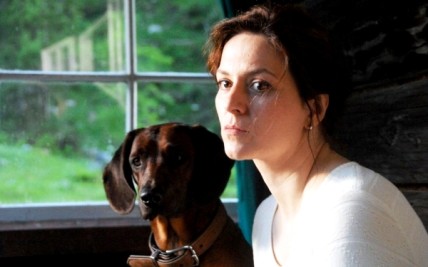
Adapted from Marlen Haushofer’s 1962 novel of the same name, The Wall (Die Wand, 2012) is German director Julian Pölsler’s debut feature following a career spent predominately in television. Starring the wonderful Martina Gedeck, Pölsler’s stripped down, philosophical slice of reflective sci-fi is a breath of fresh air within a genre driven by spectacle. Gedeck plays an unidentified woman who accompanies her cousin and husband to a secluded Austrian lodge. Set within the shadow of the Alps, this isolated cabin is the perfect dwelling for getting away from the hectic rhythm and grind of modern 21st century life.
However, when Gedeck’s party embark on a quick trip to the cabin’s neighbouring village, leaving her alone with Lynx( the family dog), she finds herself left for an unusual period of time, waking the next morning alone and curious as to their whereabouts. Understandably worried that some tragedy has befallen her companions, she leaves the lodge with Lynx in hope of answers. En route, she’s suddenly halted in her progress by the most peculiar of barriers – an invisible wall that now imprisons her in a world of suspended animation.
Despite reading like a synopsis torn from the script of a long-forgotten episode of The Twilight Zone, behind The Wall’s bizarre premise lies a story of tremendous weight and emotion. Recited entirely through Gedeck’s internal monologues, our quarantined protagonist quickly begins to rely upon the company of her canine cellmate. Before long, her troupe is expanded by the addition of a stray cat and an abandoned cow, creating a fascinating portrait of the human condition – with each creature becoming a vessel for her to pour her heart and soul into. This conscientious and deeply profound study of the human psyche is a softly-spoken and endearingly timid celebration of our own ability to adapt and endure even the harshest environs.
Gedeck’s terrific ability to express herself physically adds some much-needed emotional heft to many of the film’s more lethargic passages. Taking a high concept and diluting it into the type of reflective didactic that the likes of Andrei Tarkovsky became renowned for, The Wall is an intimate and tender study of isolation and the effects of solitude upon the mind. Also encroaching on numerous other grand and thought-provoking themes, the film’s scenic metaphorical landscape imbues the beauty of nature and all its creatures with a Kafkaesque narrative about enforced imprisonment and social exclusion.
The Wall elegantly drifts through the four seasons – with each change of temperament captured by no less than nine cinematographers – whilst the rolling Austrian slopes provide an awe-inspiring canvas against which to frame this pleasantly grounded tale of courage and survival. With his debut feature, Pölsler has created a captivating and emotionally compelling parable which harks back to an era when popular sci-fi functioned as a thoughtful and vital study of contemporary issues – rather than yet another glossy distraction from the drudgery of the modern.
Written by Patrick Gamble




